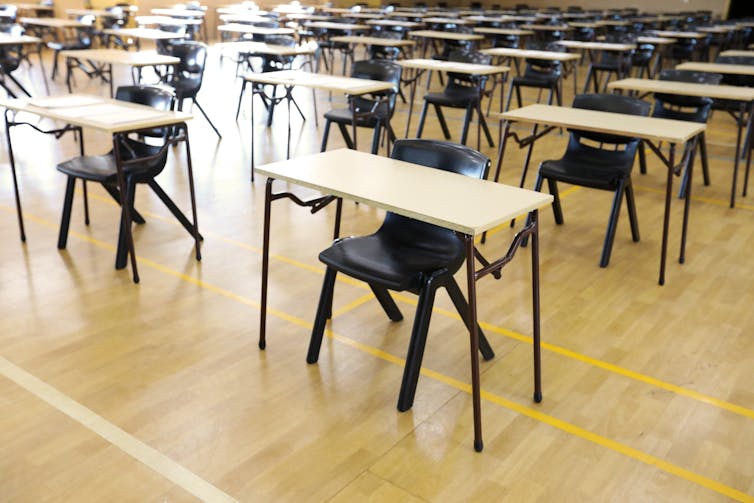
Major international and national tests show rural students, on average, do not do as well at school as their city peers.
This includes lower scores on NAPLAN and the Programme for International Student Assessment (PISA).
For example, in the 2018 PISA test, Australian students outside cities performed at lower levels in reading literacy, mathematical literacy and scientific literacy. Their average performance was between two-thirds of a year and almost two years behind metropolitan students.
Most of the studies looking at rural students have focused on primary school students. And most conflate rurality with low socioeconomic status.
In our new research, we looked at New South Wales Year 12 Higher School Certificate results in standard and advanced English and maths. We controlled for students’ social background characteristics to test if it is socioeconomic status (SES) or a rural location that impacts student results.
SES measures a parents’ level of education and so, indicates a student’s familiarity with finishing school, going to university or other forms of educational attainment.
Our study
We studied more than 73,000 students and 772 high schools in NSW in 2017. The study included all high schools, government (selective and not selective), Catholic and other independent schools, using data from the NSW Education Standards Authority.
All Year 12 students living in outer regional, remote and very remote areas who completed (standard) Mathematics General 2, (advanced) Mathematics, Standard English or Advanced English were matched to students with the same characteristics who completed the same subject in major city or inner regional areas.
These subjects were chosen because English is mandatory in the NSW HSC, each has an advanced and standard offering and both English and maths are powerful for determining post-school options. For example Advanced English and Mathematics can potentially add more to a student’s ATAR (final rank) than Standard English and Mathematics General 2.
Matching means they had the same gender, the same level of parental SES status and they attended a school with the same level of school SES and school sector.
Our results
We found that when SES is controlled for, rural students still achieve lower results than non-rural students in HSC English and maths.
Put another way, students attending schools in rural locations, regardless of their parents’ SES levels, the average SES of their peers at school, their prior achievement in NAPLAN and school sector, achieve at lower levels than their non-rural counterparts.
In Mathematics, the difference in average marks was approximately 6% and approximately 3% for Advanced and Standard English. There was no significant difference for Mathematics General 2.

Why is this happening?
Although not directly tested in this study, it is likely different and unequal opportunities around learning are playing a role here.
This includes a lack of access to some subjects in rural areas and teachers teaching out of their fields of expertise and training.
In a previous study we found if you live in a regional area you will have less access to subjects that help you get to university and more likely to be offered vocational subjects.
Rural students also have different everyday experiences from city kids. This is often overlooked in the school curriculum, especially in the HSC, where all students do the same content and exams.
In the past, we had the Country Areas Program to help schools make the curriculum more meaningful to rural students. But more recently we have focused on greater standardisation in search of “excellence”.
This new approach ignores how students come to school with different experiences, skills and prior achievements. Research shows cultural context has a an impact on student achievement in standardised tests such as NAPLAN. This is because familiarity with the examples used in questions clouds a students ability to demonstrate the skill being tested. For example, having to write about a beach when you have never been to one.
Earlier this year, a Productivity Commission review showed no significant improvements have been made in enhancing equity since programs like the Country Areas Program were abolished in favour of more standardisation.
Read more: Poorer NSW students study subjects less likely to get them into uni
What now?
We are still using the same approach of state-wide exams as we were 50 years ago. It is assumed that if everyone does the same thing, then this is “fair”.
The relationship between student background, their location and end-of-school achievement has not improved much in that time, regardless of more students finishing senior secondary school.
Read more: How to solve Australia's 'rural school challenge': focus on research and communities
This one-size-fits-all approach ignores the fact that rural students have different experiences from urban children, and often their teachers.
At the moment, the federal government is developing the next National Schools Reform Agreement, to start in January 2025. This agreement between the federal government and all states and territories is designed to lift student outcomes – and has a huge role in shaping how education works in Australia.
The next agreement can make a big difference for rural students.
Firstly, it needs to focus on achieving equity in access to senior secondary subjects for rural students. Secondly, it needs to develop a program to help teachers make curriculum more meaningful and introduce fairer means of assessment.
We can do much better than the examination-based system developed half a century ago.
Philip Roberts receives funding from the Australian Research Council (DE200100953)
This article was originally published on The Conversation. Read the original article.







